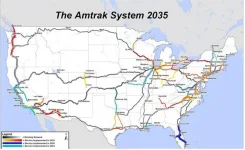If they don't pass them along, they have a hard time staying in business. The profit margin on airline travel is already meager. If people aren't willing to pay what the flight costs, they will make fewer flights or cut services elsewhere.
Airline travel is both.
You just got done saying they pass costs along, and then say they can't.
The point is that businesses can not simply pass along costs to customers. It just does not work that way. I know it sounds good, and every time there is some discussion here of cost or tax increases, people rush to post that the company will just pass it along. Companies generally can not "just pass it along" nor can companies not pass any of it along. Its more complicated than that. They certainly try, but then the free market has its say to dictate what actually happens.
Perhaps I did not explain the distinction between airfares and hidden fees. Air travel is one of the most elastic commodities out there (increases in prices often result in few travelers and less revenue). The airline business is thinner operating margin, volume business. Because of the inherent price elasticity, airlines have to be very careful adjusting fares. Air travel is a very, very competitive market, especially since its substantially a commodity. The airlines have struggled to add stickiness to the brand through tangential thinks like mileage programs and affinity credit cards (which actually make a lot more money for them then flying people, but this another discussion)
Thanks to third party booking services such as Travelocity and Priceline, the basic fares are transparent (easy to obtain and compare); the hidden fees, however, are hidden from the decision of what airline to select. So, they bait you by being competitive on the fare, THEN they pick your pocket with additional fees. Airlines used have hidden fees as a gimmick to all them to compete on Travelocity on the base fare, but then added this "extras" to the ticket. The airline came to count on yield from these additional charges.
Removing hidden charges will mean the airline will now have to compete on a substantially 'all included fare' with other airlines. Perhaps before the airline listed Denver to Chicago at $225, but then was able to get an additional $50 on side fees for a $275 yield. They can try baking these fees into the fare, it may work and it may not work, when this exposed to the competitive marketplace. If the airline that was getting 20% of his revenue on hidden fees now lists the Denver to Chicago ticket a $275, that will only work if all of the other airlines are now listing the fee at $275. If other airlines that did not rely as heavily on hidden fees, like Southwest, hold at $225, the hidden fee airline will lose business. They will have lower their fees to something closer to $225.
The result of this will be less revenue yield from hidden fees and more from the core airfares (the unhidden charge that is used on the travel platforms). The airlines will likely get away will moving some of these charges to airfares. It will also likely result in a shift in the burden toward the no frills flier, who avoided many of these charges as a part of his travel plans, and away from the guy that was willing to pay to check bags and select a seat.
The incidence of a tax (or a cost increase) gets carried by all parties, the customer and the company. The actually degree to which the company can pass it along is entirely dependant the elasticity of the product or service. Since airfares are highly elastic, airlines are in a much weaker position to simply pass it along as business that have inelastic products, just as gasoline.
I would love to tell you this is ECO 101, but its not really. They do introduce the concept of price elasticity and incidence of tax in intro eco, but its covered well. It is, however, a big part of in Intermediate Micro, which granted not too many take. All in, however, if businesses could simply pass costs along, no one would ever go out business. Its a myth that a company can just pass costs or tax increases along to the consumer. They generally eat some of it.
BTW.... because the airline industry is price elastic, when things are going well, airlines to make good money. Most of the US airlines are making terrific profits and in no danger of going bankrupt.



